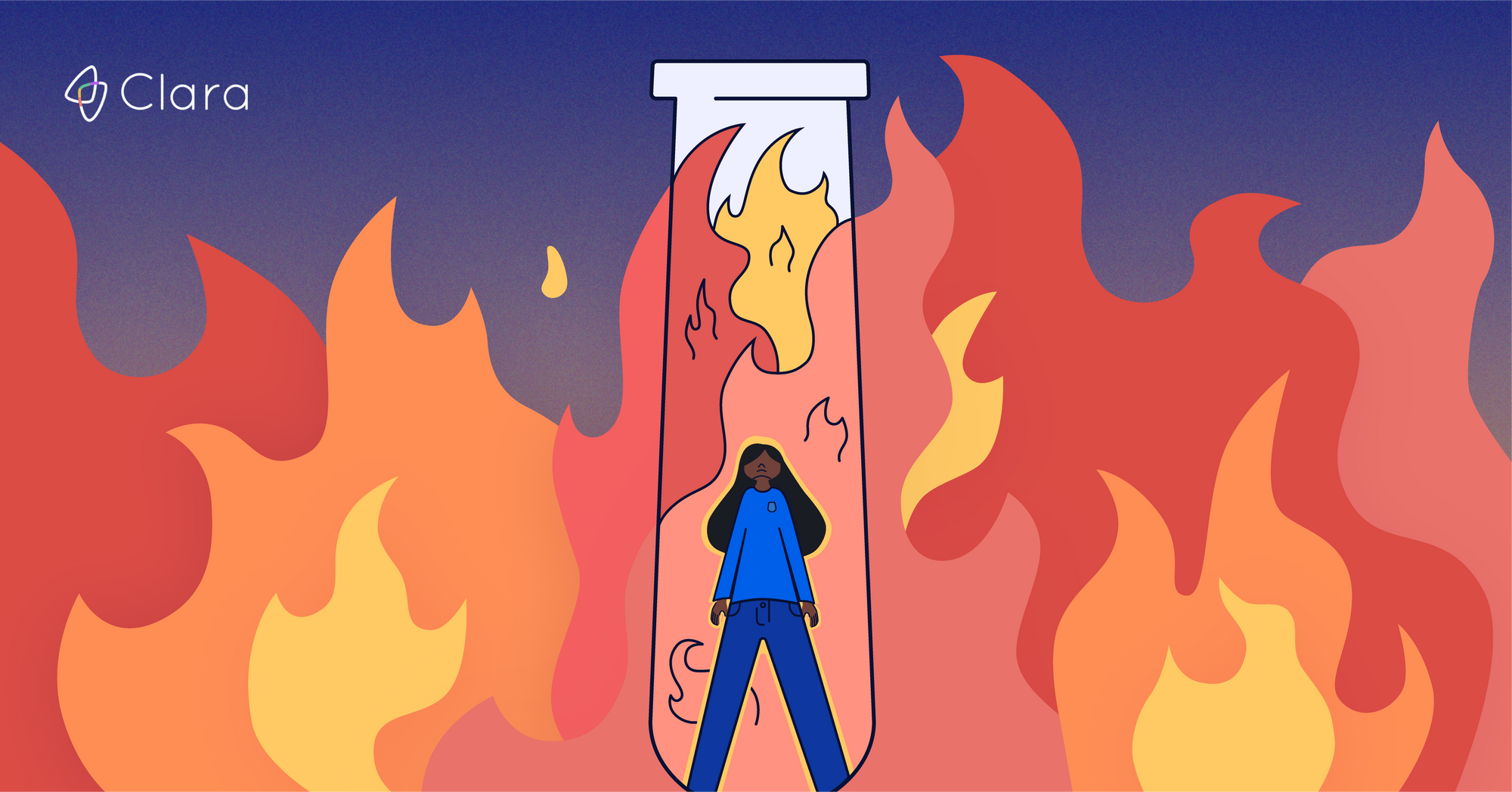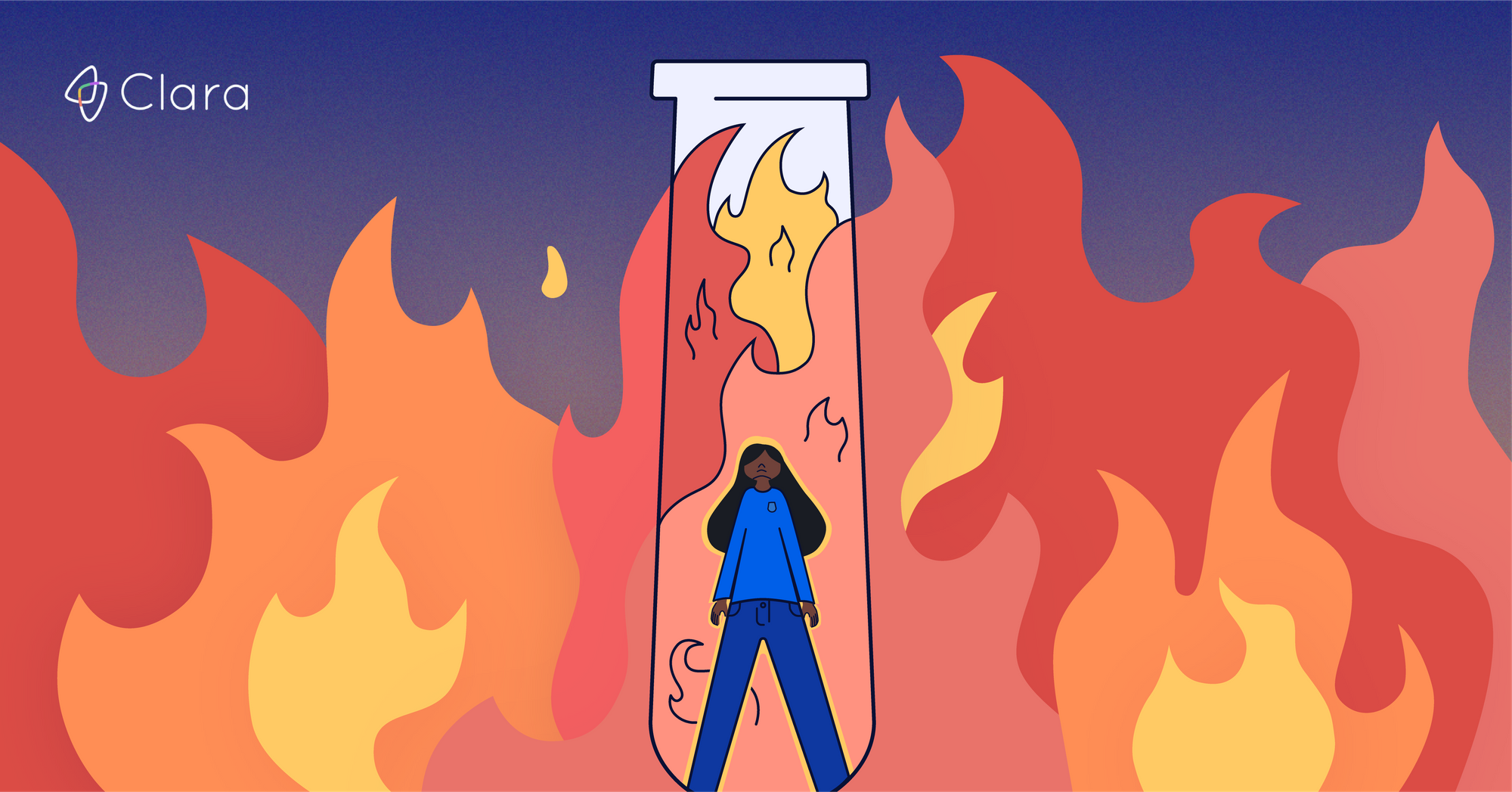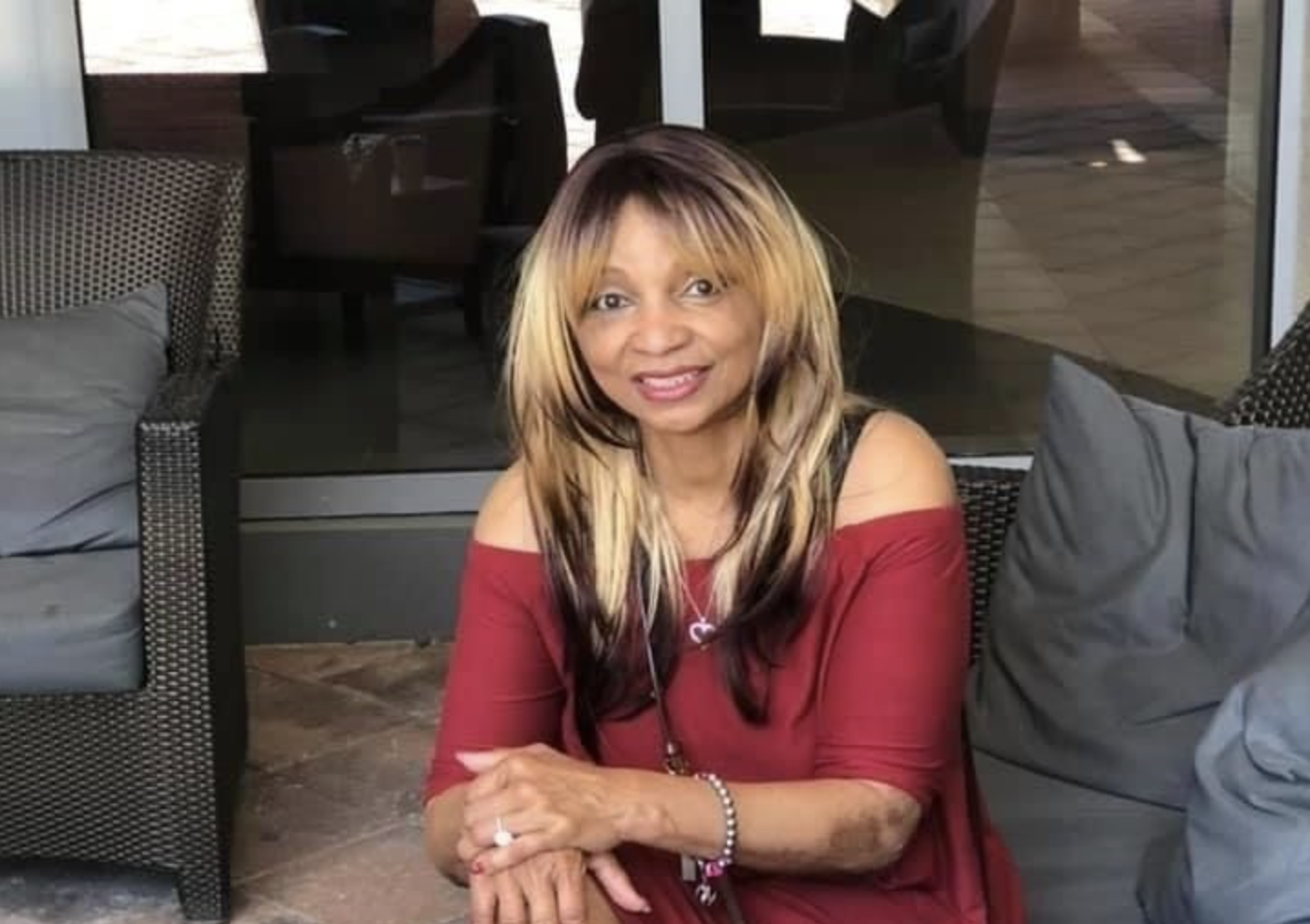Hey everyone, and welcome to the next episode of the Patients Have Power podcast! Excited to say that we are coming to you from the new Clara Health offices in sunny San Francisco.
We're loving it out here, but we definitely miss all of our friends out in Boston, especially some of our lovely patient advisors and Breakthrough Crew ambassadors who are out there, but don't worry, we will be back to visit, and we look forward to meeting some new ambassadors out here on the West Coast.
Our latest Patients Have Power episode is called "I can't tell you how many parking lots I've cried in." (You can subscribe to the podcast at Apple Podcasts, or listen to it with the media player above).
In this episode, we're talking with Rebecca Black. Rebecca is one of the most empowered advocates I have had the opportunity to encounter.
She has this really, really crazy story about her multiple chronic illnesses that she's been diagnosed with. Had a couple of misdiagnoses along the way, but at every step in her journey, because she took matters into her own hands and trusted her own body, Rebecca got the right diagnosis and got the help that she needed. And so, in my mind, she really embodies the Patients Have Power mantra, and that's why I'm so excited to have her with us today.
Below is a transcript of the episode for your reading pleasure!

Lilly Stairs: Hi everyone, welcome to the Patients Have Power podcast. I am so super excited today to have Rebecca Black with us.
Rebecca is better known as @bossladyresale on Instagram, and she has this unbelievable story, a journey that she's been through as a patient, and really embodies the Patients Have Power message, and so it's truly an honor to have her here on the podcast.
Thank you for joining us, Rebecca.
Rebecca Black: Thank you so much for having me. I'm truly honored to be here with you today!
Lilly Stairs: Yay! We're going to have so much fun.
I think we should dive right in, and I know we were just talking before about ... I'm not even sure how you consolidate your story, because it's just so remarkable, but could you maybe walk us through what brought you to this point that you're in, and what your journey has been like as a patient?
Rebecca Black: Sure! So about, I guess, gosh, it's been seven and a half years now, maybe eight, I ... It all pretty much started when my husband and I were going to start a family. I had gone off of birth control, and we obviously were trying to have a baby.
I got pregnant, I suffered from a miscarriage, and I couldn't get pregnant again. I kept having all these issues with my monthly cycles, and just hormones, and it was just ... It was a crazy time. I ended up getting diagnosed with endometriosis through my regular doctor ... Or, my OB/GYN in Ohio, and at that time.
Oh, by the way, March is Endometriosis Awareness Month, so I'm pretty excited to be doing this interview with you in March, because it happens to be that that's one of my big areas of awareness!
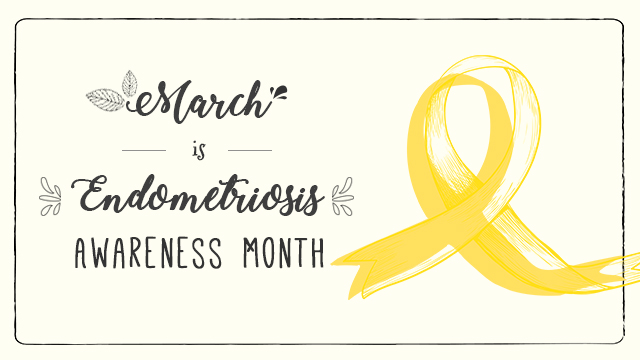
Lilly Stairs: Great plug. Actually, it's Autoimmune Disease Awareness Month as well! And two... endometriosis is an autoimmune disease.
So this was kind of the perfect month for us to do this podcast!
Rebecca Black: It's perfect, yeah! So anyway, so my journey started with endometriosis, and I had a surgery to remove it, or what I thought was to remove it.
And I truly was never, I don't think, educated on what that disease actually is, or what it meant to have it for the rest of my life. And so, after that, I kept having all sorts of random ailments and issues that were happening to me.
Along with that, I was having bowel problems and headaches, and, I mean, just every ... Pretty much every organ system I was having issues with, and I really didn't realize that endometriosis could have been causing a lot of these issues.
Rebecca Black: So I actually ended up being diagnosed with celiac disease through Ohio State University, and I went on this whole journey of completely removing every ounce of gluten in my life. My husband and I learned every recipe we could, every place we could eat, and I just dove right into it.

Lilly Stairs: How many years ago was that?
Rebecca Black: This was about six years ago.
Lilly Stairs: Like, six... even six... We've come a long way in gluten-free in the past six years, so I can't even imagine what it was like six years ago.
Rebecca Black: Yeah. Oh, well, can you imagine people who are doing it in, like, the '70s and '80s? I mean, I just can't imagine.
Lilly Stairs: No.
Rebecca Black: So, I, through my own trial and error, ended up going to therapy. I was having a really hard time with adjusting with having this disease, and she had suggested I started journaling.
That's where my blogging history has started, because I'd started blogging about my journey with this disease, and all of these things. Fast-forward about two years, and I was invited to the National Celiac Disease Symposium, which was in Chicago, and I was sitting there ... And if you have celiac disease, my friend Erica Dermer, Celiac and the Beast, is amazing.
So she and I are at this conference, and they're going over how you know you have celiac disease, the five things that you need, and I remember turning to her, and I said, "I didn't have ... I only had like one of those things done." And she's like, "Really?" I said, "Yeah, I didn't have any of those tests done that they were saying you had to have done."

Rebecca Black: Like, I had never had a biopsy of my intestines, I had never had a colonoscopy or an endoscopy. Like, I'd never had these things done.
And she's like, "Are you kidding me?" I said, "No." I said, "Oh my God, what if ..." And we kind of laughed about it at that time, but I laughed, and I said, "Oh my... What if all of this was from endometriosis?" I said, "What if all of this stuff ..."
Because part of my realization with that was that I was so dedicated to living a gluten-free lifestyle that my symptoms and my health were not improving, and one of the things about celiac disease is if you truly go like a hundred and million percent gluten-free, and you're super dedicated to it, your symptoms should, over time, start to resolve a little bit, and mine weren't at all. I was continuing to have all of these problems.
Rebecca Black: So we ended up moving to Virginia, all during this time, I'm getting reevaluated for celiac disease, I'm finding all new doctors, I have all these other things happening to me.
And we move to Virginia, and I go to the gastrointestinal doctor here, I have all these tests done, I start eating gluten again, and the doctor's like,
"You absolutely do not have celiac disease. You have other issues but you absolutely do not have celiac disease."
It ends up I had Barrett's esophagus, and all of these... And, you know, severe acid reflux, and some other, like irritable bowel syndrome, those kind of things.
Rebecca Black: So now I'm thinking, "Okay, right, this is the answer, this is the answer I'm looking for." This is about four years ago.
Fast-forward, I'm still not getting better. I'm doing all the things that I'm supposed to be doing, I'm still not getting better. You know, I have Hashimoto's, I have thyroid issues, I'm trying to put all these pieces together.
I actually went to the doctor for an ovarian cyst that had ruptured, and this was in 2015, and during that time, the tech who was doing the ultrasound said, "You know, are you having issues with your bladder?" And I said, "Yeah, actually, I have been, and I just assumed it was the endometriosis. This is how I was originally diagnosed with it; I was having a whole bunch of bladder issues."
And she's like, "Well, I need to call the radiologist, because this is concerning me, and we need to look at this further."
Lilly Stairs: Oh gosh.
Rebecca Black: So, fast-forward, ends up my kidney is failing, I'm almost in renal failure, and I'm basically shuttled to a urologist being tested for cancer and tumors and blockage. Oh, it was awful.
So I had severe left kidney hydronephrosis, my kidney ended up only being functioning at like 10% or 15%, something like that, and-
Lilly Stairs: Wow. And you were living like that for God knows how long.
Rebecca Black: Yes, yes! Yeah, so in 2015, I ended up having a surgery to fix my ureter and re-implant it in my bladder. So now, right, Lilly, now I'm like, "I'm better. This is what it was."
Lilly Stairs: Finally.
Rebecca Black: Finally, my kidney was failing, yes. And then four months later, I started getting sick again, and this time, it was so bad. Every single month that it progressed, it was getting worse and worse and worse, like the ... I was having back pain and severe fatigue.
I wasn't sleeping, so I was so fatigued, but I had insomnia. My menstrual cycles were probably the most painful things I'd ever experienced in my entire life. My migraines were coming back tenfold. I was just super bloated, I was having all these cramping issues, I was having pain in my hips, pain in my thighs, just all of this very random stuff.
Can you imagine how defeated I was? Here I am, thinking, "I just went through this major surgery, I almost lost my kidney." I'm thinking I'm healthy again", or "I'm on my road to recovery", and I get hit with this now.

Lilly Stairs: I just can't, and I mean, you ... It's like you were attacked in every part of your body-
Rebecca Black: Yes.
Lilly Stairs: And at every turn, you had a misdiagnosis, or you had the wrong care, or the wrong... I can't imagine how frustrating that is, and I know that we have a lot of listeners who have been through pieces of that, right?
Like the misdiagnosis, or being undiagnosed, an so I'm sure your story is really resonating with everyone, but please, please continue.
Rebecca Black: So, to quickly sum it up, because I know we want to dig into some of this - it ended up that I went to about 10 different doctors.
- I had been to a rheumatologist to see if I had lupus or fibromyalgia
- I went to see an endocrinologist specialist at Johns Hopkins University
- I went to a sports medicine doctor to see if I had bursitis.
- Chiropractors, to see if there was something wrong with my spine.
And the most frustrating thing about it was every single doctor I went to, I specifically asked, "Could this be caused by endometriosis?"
And every single one of them said no.
Rebecca Black: So you leave these doctor's appointments thinking, "Well, they're the experts. They have to know something, they have to know what they're talking about", right?
Well, turns out, I finally found an endometriosis specialist in New York City, and I saw him in January of last year. It turns out I have all of the symptoms for endometriosis, plus a... I always mispronounce this, it's like adenomyosis or adenomyosis.
And it's where, basically, the legions are contracting into the muscles of your uterus, and it can be cured with a hysterectomy or severe scraping of your uterus, and that kind of stuff. So I actually scheduled a surgery with him.
He was outside of our insurance network, it cost us a fortune, and that is how Boss Lady Resale was founded. Because I took a hobby that I had with reselling, and basically amped it times a hundred so I could afford this surgery.
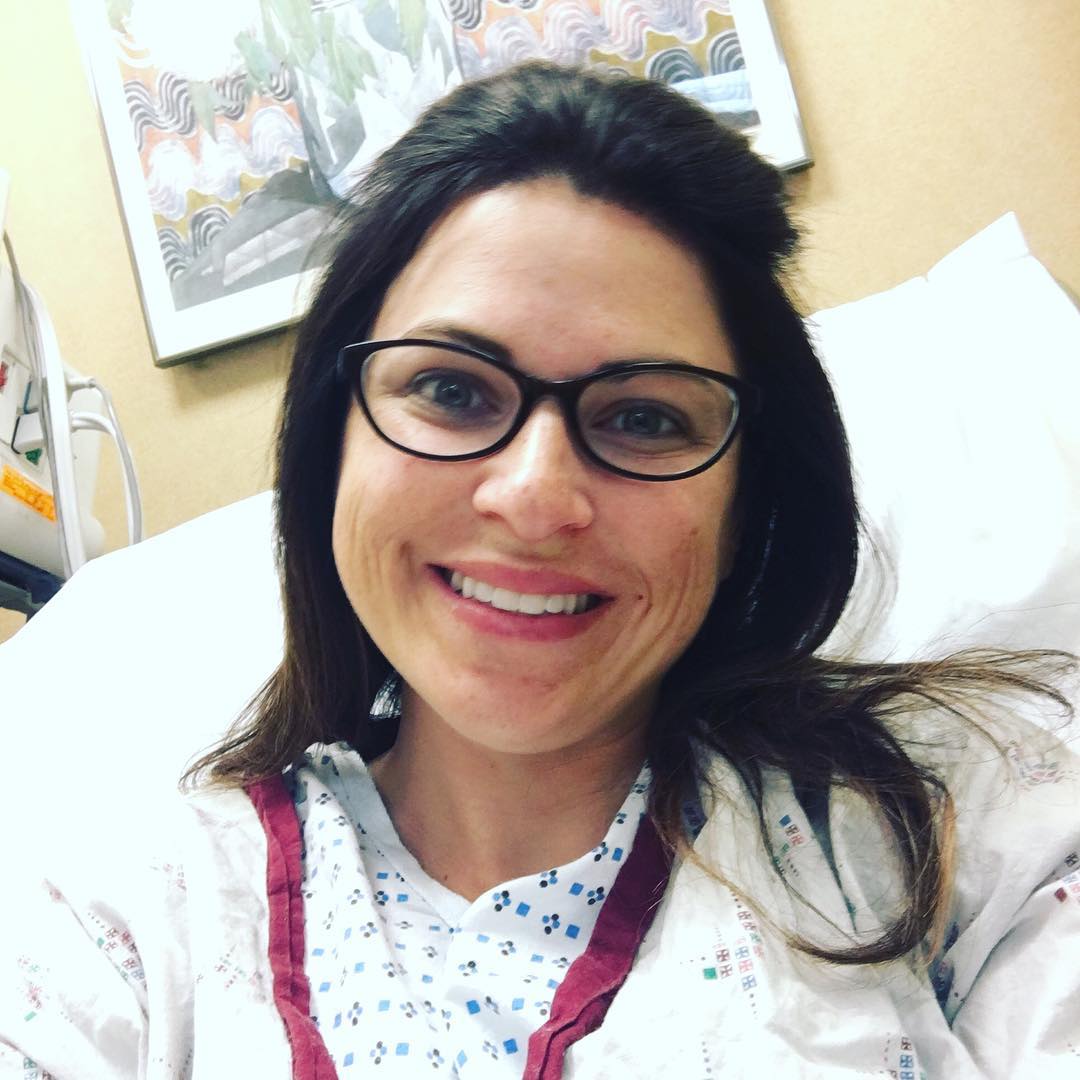
Rebecca Black: And it was the best decision I ever made. I never gave up, and I think that's what I really want to emphasize.
And I know you know this as well, but you have to be your own advocate when it comes to all of this stuff, and people say, "God, didn't that waste your time to go to all of these doctors?" Or, you know, "Wasn't that so frustrating?"
And, I mean, yeah, I can't even tell you how many parking lots I've cried in at the doctor's office, because I leave there thinking I'm going to have answers... Or I go there thinking I'm having answers, and then I leave there completely frustrated, and even more upset than I was when I got there.
Rebecca Black: I'm now on the road to recovery. It's been actually a year since my surgery. So I had endometriosis excision surgery, and I had a partial hysterectomy, so I had my uterus and my tubes removed.
And through that, it's definitely been quite the process. My hormones are still in the process of kind of figuring it out. I'm still suffering from chronic migraines and thyroid issues, and my thyroid's all out of whack now that I had that surgery.
But I will tell you that 80% of the symptoms I was having — and I had gone to all of those doctors for — are gone.
Lilly Stairs: Wow. And that's all truly because you took matters into your own hands. I feel like such a turning point was when you were at that conference, and realized that you hadn't even been tested properly for celiac disease.
Rebecca Black: Right?
Lilly Stairs: But what patient would ... What person would know that, unless you really did the research on it? And you had to go to a conference to learn that.
Rebecca Black: Exactly.
Lilly Stairs: It's such a perfect example of ways that patients really can make all the difference in their journey and their diagnosis.
And we know our bodies best. So if something does not feel right to you, even if a doctor says, "Well, no, it can't be this, no, it can't be that". If it doesn't feel right to you, you need to go seek a second opinion, you need to keep fighting for yourself. And it's unfair that we have to do that sometimes.
Doctors, they are brilliant, but they don't have every single answer that we need, and it's not necessarily their fault. But it's about us being empowered and saying, "Hey, I know me, and this isn't right."
And you did that, so I applaud you for that, and I applaud you for going all the way from Virginia to New York to get a surgery and seek care outside of your insurance. I mean, that's such a scary thing to have to do.

Lilly Stairs: And now - this is what I really want to talk about as well - you are totally such a badass empowered woman. Like, you're working from home, and I remember when we had spoken before, you're like, "I just want patients to understand, even if you can't go to a desk job every day or can't go and work..."
You know, you're still being empowered, and you're making a living for yourself, and you're paying off your medical bills. So do you want to tell me a little bit more about how you do this, and how it all works, and your philosophy behind it?
Rebecca Black: Sure. So I've kind of always been the queen of side hustles, and I can remember even when I was a teenager, I always had multiple jobs. I always had all sorts of little things I was doing, or hobbies, or ways to make money. And so I've always had a career, and then a side job.
For a while, I decorated cakes, and I was teaching group fitness, and all of that kind of stuff. So, for me, reselling has been something I've been doing for, oh gosh, probably 15 years.
And primarily, it started because I couldn't afford all the nice stuff I wanted when I worked for children's services in my first job outside of college. I really wanted designer jeans and nice purse, and so that's when I found eBay and started selling my stuff on there.

Rebecca Black: And it's kind of funny how things go full circle, because really, when I started getting into it more, way back when, was our dog that we had adopted needed surgery. This is so ironic how this works.
So our dog needed knee surgery, and it was going to be like $1,500 or $1,800, and my husband and I were like, "Well, we don't have that just laying around," and so I remember selling my Coach bags and some shoes I had on eBay to pay for my dog's surgery.
Lilly Stairs: Aw.
Rebecca Black: There's part of me that, I guess, in my brain, I'm like, "Oh, well, I did that for the dog, why can't I do that for myself?" But for me... And I know that there's a lot people I've met and I've spoken to - and not just women. I mean, there's men out there too, and it's so hard when you're, I call it "ably disabled," or, you know, where you're... you're not disabled, right?
So you can do stuff, but you almost ... You're disabled in the sense that you have to do it around your health. So, most employers want you to work nine-to-five, or you have a schedule, and so chronic migraines don't care that you have a nine-to-five job, you know?
And that's what I was really struggling with, was I would call off sick, and two or three days a month. Well, employers do not want people who call off three or four days, five, six, seven days a month, and I couldn't predict when I was going to be sick.
Lilly Stairs: Of course.
Rebecca Black: And so I had to do something, because not only did I want to go to this doctor who was not in our insurance network, but I also want to contribute to our household and be an active part of our family.
And so I just took this reselling hobby of mine, and I said, "Hey, you know, I can ship when I need to, I can buy stuff when I need to," and I made it work. And I also did some other consulting, and different side gigs on the side. I still do personal training every once in a while, and I do social media consulting for small businesses.
So I kind of found a bunch of things that I was really good at, and then I created my own little small business, I guess you could say, out of my own little skills I have.
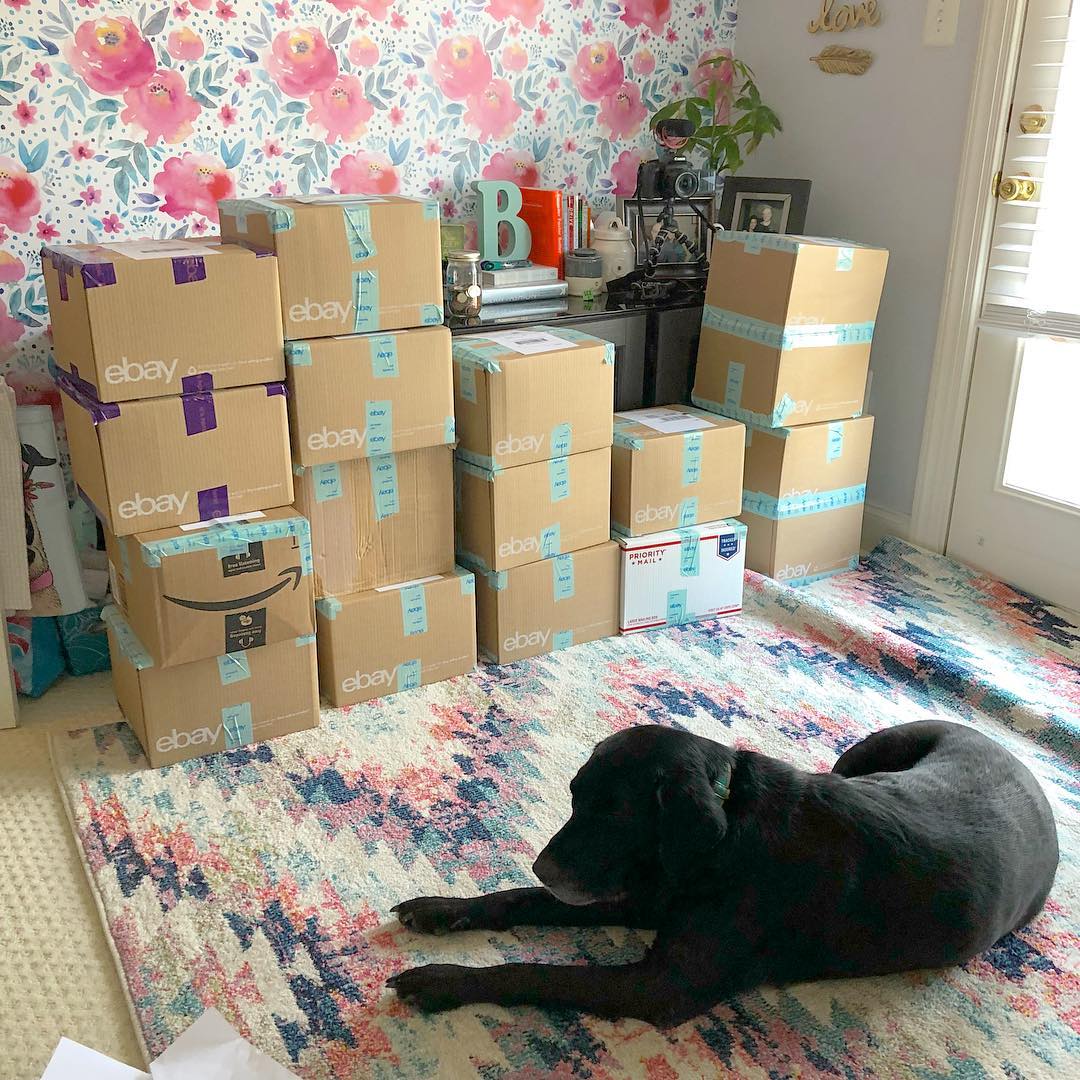
Rebecca Black: And so if anybody is ... I mean, not everybody has to do reselling, so obviously, I'm not saying, "Hey, go out and sell all your stuff," - although it is an easy way to make money.
But people have so many different skills, and I think if you just sat down and brainstormed, you know, "What am I really good at, and what would people pay me for?" So maybe it's consulting in something that you've done full-time, or you're offering a service, or creating an online course, or even blogging.
Any of those things can turn into a financial resource for you.
Lilly Stairs: Yeah, and I think that is so important for other people and patients to hear, and being able to have that flexibility.
Because you have days, like you said, you can't say, "Oh, migraine, can you please come on Friday the 16th, because we don't have a lot going on in the office." I mean, that's just not an option, and whether it's a migraine or just fatigue, I know so many of us have this crippling fatigue where sometimes you feel like you can't even type a text message to a friend.
And of course, I don't think either of us are suggesting if you're a person who's really in a flare, and you're very sick, you shouldn't feel obligated to have to go out and try to do something.
Rebecca Black: Of course.
Lilly Stairs: Because, even from home, like you said, if you're texting, or you're on your computer blogging, it can just feel like a lot of work. But if you're in a place where you have a couple days a week where you're feeling good, and you want to get back on the horse and try your hand at something, I think that you are such a shining example of that, Rebecca, and I so admire what you have done.
And the path that you have been on, it's such a perfect example of what we as patients need to be doing. And that is to trust ourselves and to speak up for ourselves, even when it's difficult, uou feel like the physician is the one who holds all the power. You have that power.
Lilly Stairs: I'd like to ask, as a way to close out the podcast, what does Patients Have Power mean to you?
Rebecca Black: Well, so one thing that I just want to talk about just briefly, that I thought of while we were talking about this.
You had mentioned how I've been to New York and Virginia and Ohio, and all of these doctors - my best advice to patients who are dealing with this is to remember that (And I know I'm going to kind of go on a little one-minute tangent about this), but electronic health records are not the best for patients that are going to multiple providers or multiple doctors, or ... You know what I mean? Like, different providers.
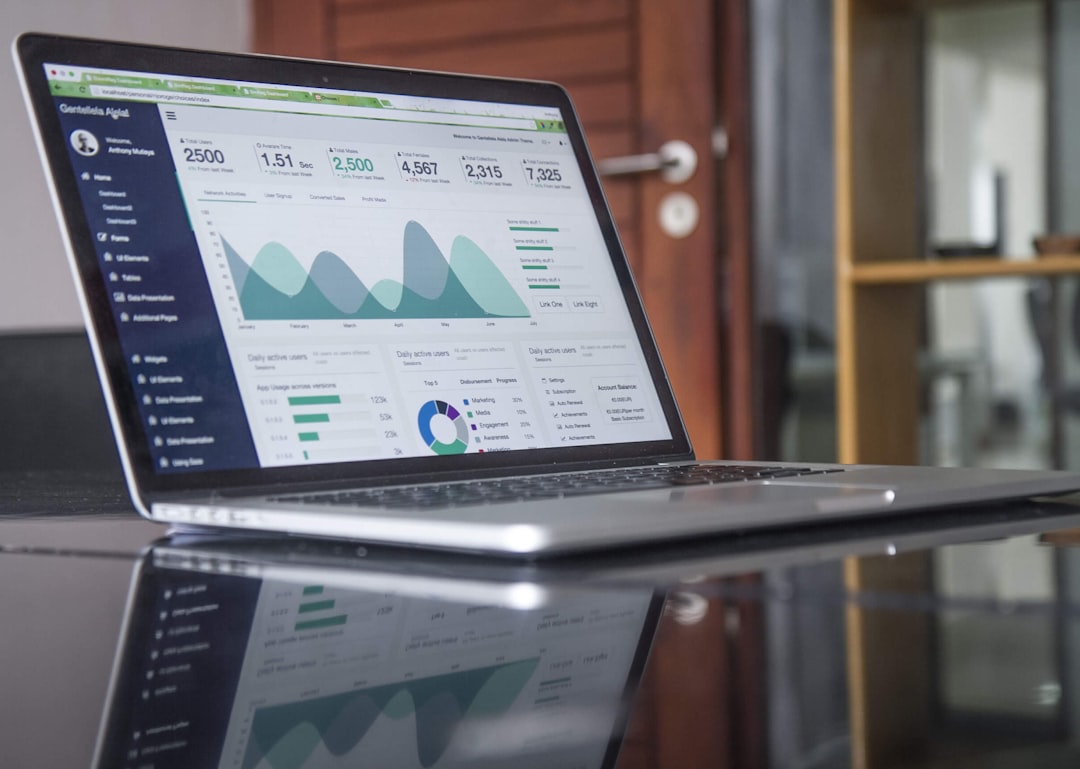
Rebecca Black: So I really want to encourage everyone to know what's in their records, and if they're going to a different facility, know that even though you have your records sent there, they might not have received them, they might not even have looked at them.
So if you're making new appointments places, being prepared as a patient and having that power of knowing what your history is, because that's truly how I was able to eventually get an answer, was that I was so persistent at all these doctor's appointments, and I knew everything that I had done.
I came in with a binder of my test results that were highlighted, and here's what's happening, because most of the time, they don't even... You know, you have what, 10 minutes with them, 12 at the most? And so being able to know my history, know what's going on with my care, and that really, I mean, I have even heard of people taking, what, 10, 15, 20 years to get diagnosed with some of these diseases.
Rebecca Black: So I think the only reason that I maybe was able to kind of jump ahead on this was that I was so diligent about knowing my health records, knowing my own health, and obviously, like you said, knowing my body.
That made me a powerful patient.
Being aware of what was going on in my own health records, in my own body, and being able to advocate for that and be persistent with my needs and what was going on in my health, with all of these different providers, I think definitely gave me an upper ... Not an ... Like an edge.
It gave me an edge above, maybe, I don't know, someone else who's going a lot of places, and then not really understanding that maybe they're not talking to each other, or the providers aren't sharing their information.
Lilly Stairs: Yes, I am so, so, so glad you brought that up. It is so important to really do your own tracking. Unfortunately, when you actually get access and find your electronic health records after waiting weeks, and requesting them, and saying, "Can I have this? Can I have that?" And then they come in pieces.
I mean, I've gone into my health records, and I was diagnosed with psoriatic arthritis, and I saw that one physician had written "rheumatoid arthritis," and I was like, "Well, this isn't true, it's a completely different diagnosis." That makes a big difference, and so making sure that you have access.
Some patients have told me that they ask their physician to say out loud what they're writing down, so that they know what is going into their health record, and that is so important.
Don't be afraid to do that.

Lilly Stairs: And definitely keep your own log. It's a pain, but keep your own log. I think someday, we will get there with electronic health records, but we're not there yet, and so unfortunately, as patients and caregivers, we hold the burden of needing to really manage our history as a patient.
Thank you so much for bringing that up, because I think it's a really, really important point, and certainly a way that patients can feel more empowered when you're walking into the doctor's office. So, thank you so much for sharing that.
And did you have any last thoughts on Patients Have Power in general?
Rebecca Black: I want people to know not to give up. It can be so frustrating, and so defeating and exhausting, and just mentally ... It's mentally exhausting to be chronically ill, on top of being physically ill.
You know, you've got to deal with everything else in your life. And I just want to emphasize to people to not give up. If you know something is wrong, and you know that it's just not sitting right, or you're not getting help, don't give up. Don't give up on yourself, on your health. Like, I will never be a hundred percent, I know that, but I can manage what I can manage, right? I can try to manage what I can manage, and the rest I have to make accommodations for.
So don't give up, if you ... Whether it's trying to find a diagnosis, or trying to financially support your medical bills or your family, or feeling like you need a purpose, any of that, I just want to tell people, "Don't give up."
Rebecca Black: And I also ... I had, like, a nervous breakdown last weekend, so I'm definitely not immune. I don't want anyone to think, "Oh, you're over the bridge, so that's why you're saying this," because I definitely have bad days.
I have them just like everybody else, and you've just got to deal with those, and then hope that the next day is going to be better.
Lilly Stairs: That is a beautiful way to end, so thank you so much for being vulnerable and sharing your story, and being so empowered, and inspiring the rest of us to be empowered.
You are a shining example for me, and I'm so glad that we've been able to connect, and so glad that we had you on the podcast. We'd love to have you back sometime. Thank you for being here.
Rebecca Black: You are so, so welcome.
Lilly Stairs: Thank you all so much for joining us. We will see you next week for another episode. In the meantime, be well, and remember that you hold the power.
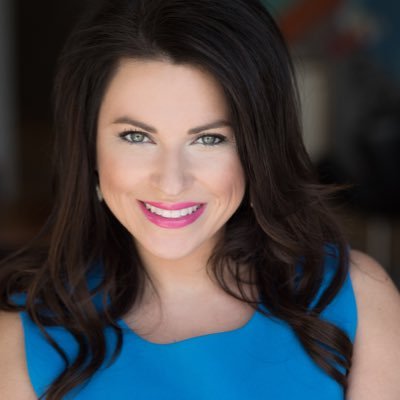
Be sure to follow Rebecca on Instagram @bossladyresale, twitter @bexabosslady, check out her website, and head over to her YouTube channel. She'll tell you a little bit more about what she's doing there!


